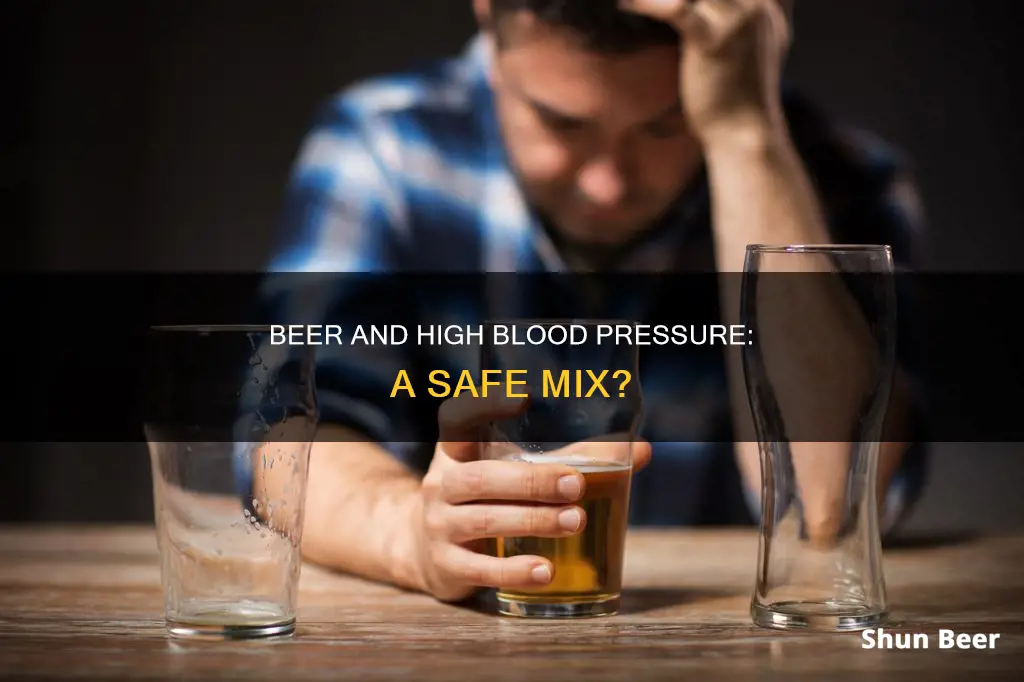
Alcohol consumption is a common pastime for many people, but it is important to understand the effects it can have on your body, especially if you have high blood pressure. Drinking alcohol can temporarily lower blood pressure, but this effect is short-lived, and regular, heavy drinking can lead to chronic high blood pressure.
Drinking alcohol in moderation is generally considered safe and may even have some health benefits. However, for people with high blood pressure, the risks may outweigh the benefits. Alcohol can interact with high blood pressure medications and cause dangerous side effects such as dizziness, fainting, and irregular heartbeat. It is crucial to discuss alcohol consumption with your healthcare provider if you are taking any medications.
The amount of alcohol consumed and individual factors such as age, gender, and health conditions play a role in determining the impact on blood pressure. Excessive drinking, defined as more than two drinks per day for men and one drink per day for women, can lead to a rapid increase in blood pressure, especially for those with very high hypertension.
While light to moderate drinking may not significantly affect blood pressure, it is important to consider other risk factors. Alcoholic beverages are high in calories and sugar, contributing to weight gain and diabetes, which are also risk factors for high blood pressure. Additionally, alcohol's impact on the nervous system, kidneys, and blood vessels can lead to a gradual increase in blood pressure over time.
If you have high blood pressure, limiting or quitting alcohol is one of the most effective ways to lower it. Reducing alcohol intake can lead to noticeable improvements in blood pressure readings and overall health.
What You'll Learn
- The effects of alcohol on blood pressure depend on the time after drinking
- Alcohol may lower blood pressure in the short term
- Alcohol increases blood pressure in the long term
- Alcohol interacts with high blood pressure medications
- Alcohol may increase the risk of other health complications that cause high blood pressure

The effects of alcohol on blood pressure depend on the time after drinking
Alcohol can have both acute and chronic effects on blood pressure. The effects of alcohol on blood pressure depend on the time after drinking and the amount consumed.
Low-dose alcohol
Low-dose alcohol consumption (less than 14 grams of alcohol) within six hours of drinking does not affect blood pressure but can increase heart rate. However, there is a lack of studies examining the effects of low-dose alcohol beyond six hours.
Medium-dose alcohol
Medium-dose alcohol consumption (14 to 28 grams of alcohol) within six hours can decrease systolic and diastolic blood pressure. This hypotensive effect may last up to 12 hours, but the evidence is limited beyond six hours. Heart rate also increases within six hours and remains elevated for up to 24 hours.
High-dose alcohol
High-dose alcohol consumption (>30 grams of alcohol) can decrease systolic and diastolic blood pressure within six hours, and this effect can last up to 12 hours. However, blood pressure increases beyond 13 hours after consumption. Heart rate increases significantly within 24 hours of consumption.
Binge drinking
Binge drinking, defined as consuming five or more drinks for men or four or more drinks for women within two hours, can cause a temporary spike in blood pressure.
Long-term effects
Regular and heavy alcohol consumption is associated with chronic high blood pressure. Moderate drinkers (seven to 13 drinks per week) are twice as likely to develop hypertension compared to non-drinkers. Additionally, alcohol interacts with high blood pressure medications and can cause dizziness, fainting, and irregular heartbeat.
Recommendations
Limiting alcohol intake or abstaining from alcohol altogether is recommended to manage high blood pressure. The American Heart Association suggests no more than two drinks per day for men and one drink per day for women.
Beer and Trazodone: Safe Mix or Health Risk?
You may want to see also

Alcohol may lower blood pressure in the short term
According to a 2020 review of 32 randomised controlled trials, alcohol has a biphasic effect on blood pressure. It decreases blood pressure up to 12 hours after consumption and increases blood pressure after 13 hours.
The review found that a medium dose of alcohol (14 to 28 g) within six hours decreased systolic blood pressure by 5.6 mmHg and diastolic blood pressure by 4 mmHg. A high dose of alcohol (>30 g) within six hours decreased systolic blood pressure by 3.5 mmHg and diastolic blood pressure by 1.9 mmHg.
The American Heart Association recommends no more than two drinks per day for men and one drink per day for women.
Beer Drinking: Does It Harm Brain Cells?
You may want to see also

Alcohol increases blood pressure in the long term
Alcohol is consumed by over 2 billion people worldwide and is a common substance of abuse. It can lead to more than 200 disorders, including hypertension. Alcohol has both acute and chronic effects on blood pressure.
Drinking too much alcohol can raise your blood pressure. If you have high blood pressure, your healthcare professional may ask you to cut back on drinking. The American Heart Association recommends no more than two drinks per day for men and one drink per day for women.
High-dose alcohol has a biphasic effect on blood pressure; it decreases blood pressure up to 12 hours after consumption and increases blood pressure after 13 hours. High-dose alcohol increases heart rate at all times up to 24 hours.
The molecular mechanisms through which alcohol raises blood pressure are unclear. Alcohol can affect blood pressure through a variety of possible mechanisms. Acute alcohol consumption affects the renin-angiotensin-aldosterone system (RAAS) by increasing plasma renin activity. The RAAS is responsible for maintaining the balance of fluid and electrolytes. An increase in plasma renin results in increased production of angiotensin I (AI), which is converted to angiotensin II (AII) by angiotensin-converting enzyme (ACE). The hormone AII is a potent vasoconstrictor that stimulates aldosterone and vasopressin secretion from the adrenal gland, promoting sodium and water retention. As a result, peripheral resistance and blood volume are increased, leading to elevated arterial blood pressure.
Several clinical trials in humans and studies conducted in animal models have reported stimulation of the sympathetic nervous system and increased noradrenaline after alcohol consumption. When noradrenaline stimulates the adrenergic receptors located in the heart muscles, heart rate and blood pressure are increased.
Alcohol has been reported to diminish baroreceptor sensitivity, which is a key factor in regulating blood pressure. Baroreceptors or stretch receptors are mechanoreceptors located on the arch of the aorta and the carotid sinus. They can detect changes in blood pressure and can maintain blood pressure by controlling heart rate, contractility, and peripheral resistance. Acute administration of alcohol stimulates the release of histamine and endorphin, which interferes with baroreflex sensitivity.
Another possible mechanism is the increase in plasma cortisol levels following heavy alcohol consumption. Several studies have suggested a role for cortisol in alcohol-induced hypertension. Cortisol is a type of steroid hormone, and the presence of excess cortisol has been associated with elevated blood pressure in normotensive individuals.
In conclusion, alcohol increases blood pressure in the long term. High-dose alcohol consumption increases blood pressure after 13 hours and could lead to increased blood pressure the day after consumption. Thus, regular consumption of high doses of alcohol could lead to a sustained increase in blood pressure and the adverse consequences associated with hypertension.
Beer and Gallbladder Removal: Safe Drinking Post-Surgery?
You may want to see also

Alcohol interacts with high blood pressure medications
Mixing alcohol with certain high blood pressure medications can cause orthostatic hypotension, which is low blood pressure when you stand up from a sitting or lying down position. This may lead to dizziness, lightheadedness or fainting. These effects can be worse at the beginning of treatment or when increasing your dose.
Alcohol can also cause heart rhythm problems (arrhythmias) when mixed with many common medications, including lisinopril and amlodipine. Drinking while taking certain antihypertensives known as "alpha blockers" can cause dangerously low blood pressure.
Additionally, liver enzymes are often responsible for how medicines are changed in the body before they are excreted. Alcohol can affect these liver enzymes and alter drug levels in your bloodstream. This can make medication side effects worse or lower the effectiveness of your medicine.
- ACE inhibitors or ARBs like lisinopril or losartan
- Alpha blockers like clonidine or doxazosin
- Antianginal agents (nitrates) such as nitroglycerin or isosorbide
- Beta-blockers like atenolol or metoprolol
- Diuretics (water pills) like hydrochlorothiazide or furosemide
- Calcium channel blockers such as verapamil or amlodipine
Beer and Tramadol: A Risky Mix?
You may want to see also

Alcohol may increase the risk of other health complications that cause high blood pressure
Alcohol consumption can increase the risk of several health complications that, in turn, cause high blood pressure. Firstly, alcohol can lead to an increase in blood calcium levels, which increases the sensitivity of blood vessels to compounds that constrict them, thereby raising blood pressure. Secondly, alcohol decreases baroreceptor sensitivity, which is a key factor in regulating blood pressure. When blood pressure decreases, baroreceptors help to minimise the stretching of blood vessels to increase blood pressure. Conversely, when blood pressure increases, baroreceptors increase the stretching of blood vessel walls to decrease blood pressure. By decreasing baroreceptor sensitivity, alcohol prevents the body from detecting a need to stretch the blood vessels and increase their diameter, ultimately causing an increase in blood pressure.
Thirdly, alcohol increases blood cortisol levels, which can lead to elevated blood pressure in normotensive individuals. Cortisol is a hormone that regulates the body's response to stress and also influences metabolism, immune function, and inflammatory pathways.
Additionally, alcohol consumption can cause liver disease and liver failure, which are associated with an increased risk of hypertension. Finally, excessive alcohol intake can lead to obesity, which is a contributing factor to high blood pressure. Obesity can cause disruptions in the renin-angiotensin-aldosterone system (RAAS), which regulates blood pressure.
Christians and Beer: Is Drinking Allowed?
You may want to see also
Frequently asked questions
It depends on how much you drink and how often. Drinking more than two beers a day may raise your blood pressure. If you have high blood pressure, your healthcare provider may ask you to cut back on drinking.
Alcohol can cause a temporary spike in blood pressure, especially if you binge drink. In the long term, drinking heavily and regularly can lead to chronic high blood pressure.
Alcohol raises blood pressure due to its effects on the nervous system, kidneys, and blood vessels. It also increases the risk of high blood pressure indirectly by contributing to weight gain and diabetes.
Yes. Limiting or quitting alcohol is one of the best ways to lower your blood pressure.
The American Heart Association recommends no more than two drinks per day for men and one drink per day for women.







